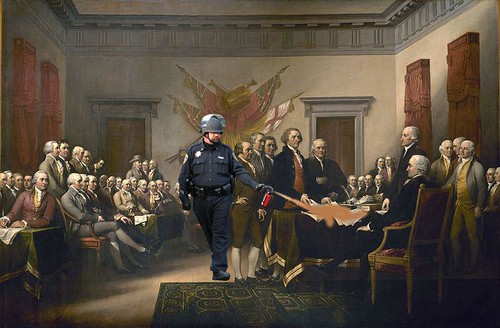[Various photo-shopped images of Lt. John Pike adding to famous pictures or paintings have begun to circulate the internets. Via Flickr.]
Police at UC Davis used pepper spray to disperse peaceful demonstrators at UC Davis, setting off a firestorm of protest, the suspension of two officers, and calls for the school’s chancellor Linda Katehi to resign. But is all the outrage over this so-called "non-lethal" use of force justified? The facts glaringly all point to "absolutely."
Pepper spray, also known as OC spray (from "Oleoresin Capsicum"), OC gas, and capsicum spray, is a lachrymatory agent (a chemical compound that irritates the eyes to cause tears, pain, and even temporary blindness) that is used in riot control, crowd control and personal self-defence, including defense against dogs and bears. Its inflammatory effects cause the eyes to close, taking away vision. This temporary blindness allows police to more easily restrain subjects and permits the person(s) using pepper spray an opportunity to escape.
Although considered a non-lethal agent, concerns have been raised concerning a number of deaths where being pepper sprayed may have been a contributing factor. An ACLU report (pdf format) documents 27 people in police custody who died after exposure to pepper spray in California alone since 1993. However, admittedly the ACLU report counts any death occurring within hours of exposure to pepper spray. In all 27 cases, the coroners' report listed other factors as the primary cause of death, though in some cases the use of pepper spray may have been a contributing factor.
An updated report (pdf format) from the ACLU detailed even more fatalities tied to the use of pepper spray that raised even more questions concerning the safety of its use.
The U.S. Army concluded in a 1993 Aberdeen Proving Ground study that pepper spray "is capable of producing mutagenic and carcinogenic effects, sensitization, cardiovascular and pulmonary toxicity, neurotoxicity, as well as possible human fatalities."
Pepper spray was widely approved in the US despite the reservations of the U.S. military scientists after it passed FBI tests in 1991, although the head of the FBI's Less-Than-Lethal Weapons Program at the time of the 1991 study - the only research to counter the Army's 1993 study - was convicted of illegal payments related to those FBI tests.
Via:
A former F.B.I. agent who pleaded guilty to taking kickbacks from a pepper-spray manufacturer was sentenced on Friday to two months in Federal prison.
The former agent, Thomas W. W. Ward, 49, the bureau's former chief of pepper-spray testing and research, was sentenced to two months in prison and three years' probation.
In pleading guilty to one count of accepting an unlawful gratuity, Mr. Ward admitted taking $57,500 in kickbacks from a pepper-spray manufacturer.
...
Based on Mr. Ward's research and testing, the Federal Bureau of Investigation decided to buy the chemical product "Cap-Stun," whose active ingredient, oleoresin capsicum, is derived from cayenne pepper. The spray was sold by Luckey Police Products of Fort Lauderdale, Fl.
From a report titled "When Police Play Russian Roulette …" co-authored by Van Jones, makes "The case for a moratorium on police use of pepper spray":
"Pepper spray’s association with numerous in-custody deaths is cause for the most
serious concerns. Conclusive answers are difficult due to inadequate research, but
it is impossible to ignore the similarities found between numerous fatal incidents.
John Crew, director of the ACLU Police Practices Project in San Francisco,
estimates a national total of at least 100 people reported dead after being pepper
sprayed and restrained by police. The actual numbers are likely significantly
higher. In California, there has been no formal tracking system to monitor the
effects of pepper spray since 1995. This means that it is now much more difficult
for interested agencies to monitor deaths and serious injuries related to police use
of pepper spray. The death may go unrecorded unless the death received
considerable media attention or is reported by surviving family members."
"The lack of scientific research and the elimination of documentation requirements
also complicate the coroner’s job. In its report, Pepper Spray Update: More
Fatalities, More Questions, the ACLU flags the possibility of under-reporting of
pepper spray related deaths because “so little is known about the residual effects
of pepper spray that medical examiners may not know what to look for during an
autopsy. "Without documentation requirements, coroners may not even know
that pepper spray was used on the deceased individual. Furthermore, misleading
medical terms may disguise pepper spray’s role in an in-custody death. For
example, “excited delirium” is used as an explanation for many of the fatal cases."
In 1997, Amnesty International condemned pepper spraying as "cruel, inhuman and degrading treatment of such deliberateness and severity that it is tantamount to torture."
Bear in mind now that the outrage here is not the use of pepper spray for self-defense when a person's life is directly threatened, or even its use in such volatile situations such as prison riots.
This is about a potentially lethal substance being used against peaceful people exercising their Constitutional right to freedom of speech. It's about people's children attending school finding their political voices and expressing their beliefs, peacefully, and and having that time in their lives respected. And just days before that it was about a priest, a pregnant teen and a 4'10" tall 84-year-old woman peacefully exercising their Constitutional rights and outrage that they met the same fate when they should have received respect. None of these people were harming or threatening to harm anyone, yet any of them could have been killed. That, is an outrage.
















